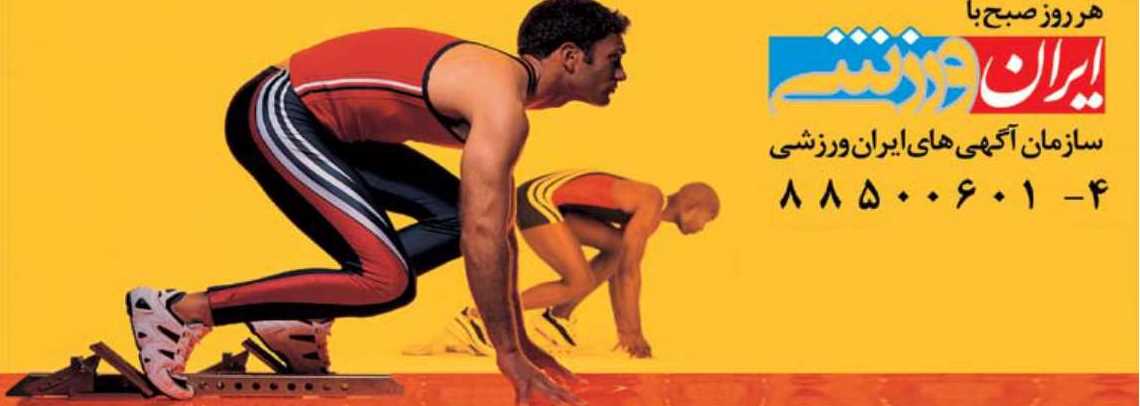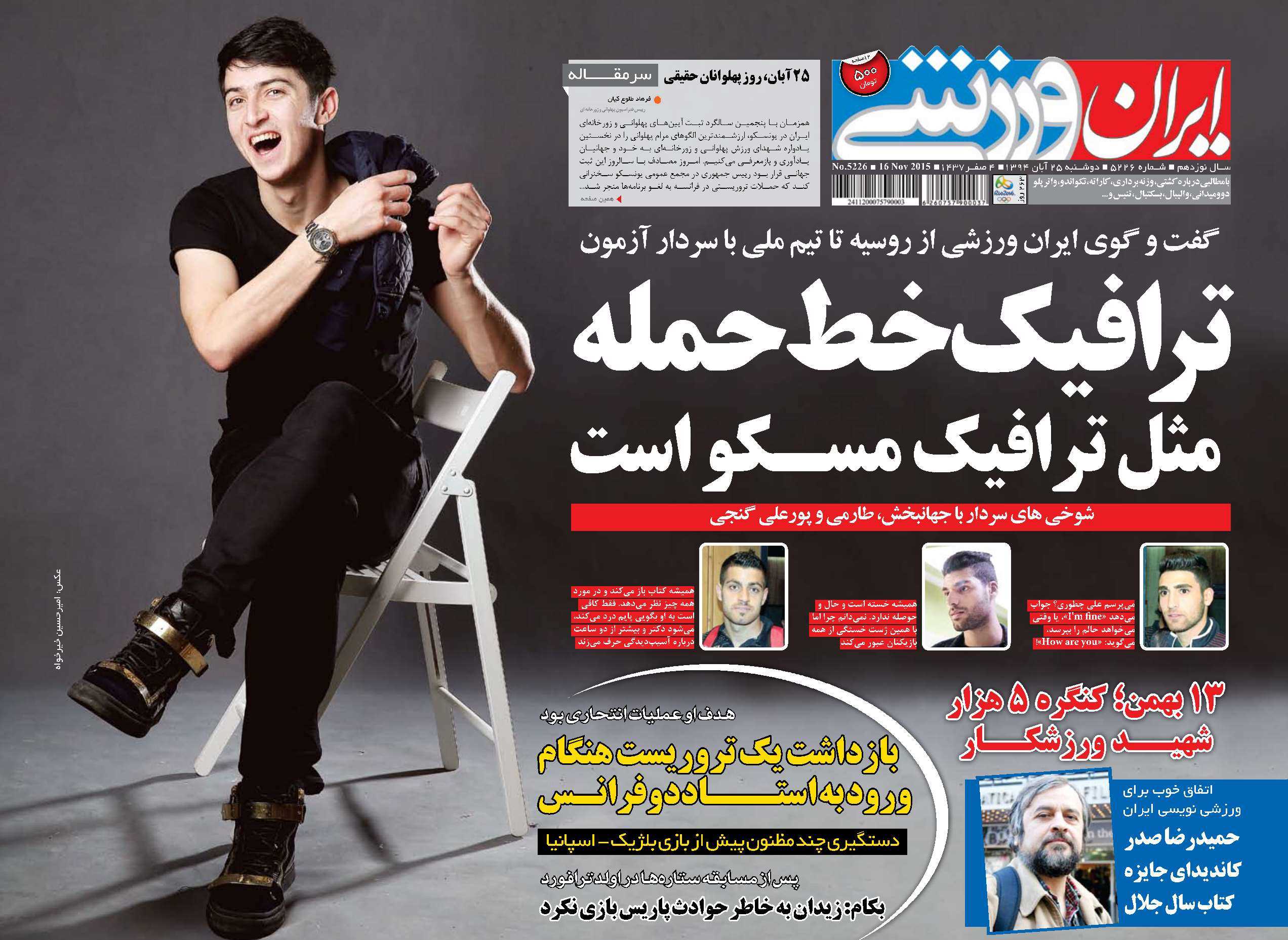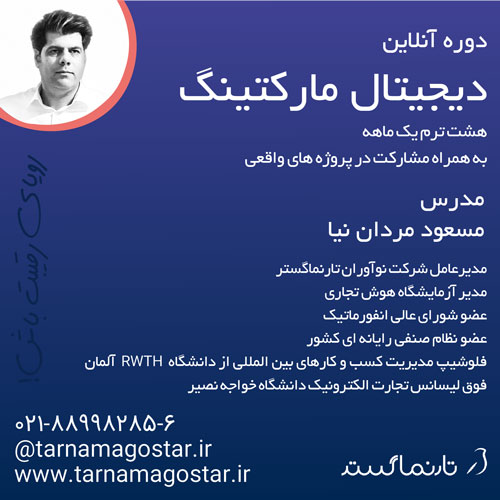عناوین این صفحه
-
قلعهنویی: به بازیکنان گلگهر تبریک میگویم

-
شکایت پرسپولیس از مدیر رسانهای استقلال

-
حکم 83 هزار دلاری استوکس علیه پرسپولیس

-
صدور کارت یعنی تأیید استعلام

-
دادرس: برای شکسته شدن رأی کمیته انضباطی، گلگهر باید ادله قوی داشته باشد

-
شهرزاد ایرانی، تحول آفرین در فوتسال کویت

-
حسینی، یامگا، ژستد و یزدانی میان غایبان

-
اهداف «نوروز کاپ» محقق میشود؟

جستجو بر اساس تاریخ
نظرسنجی
شماره : 6928 /
۱۴۰۰ يکشنبه ۲۸ آذر
|
|
بازی جام حذفی از لیگ مهمتر است
قلعهنویی: به بازیکنان گلگهر تبریک میگویم
امیر قلعهنویی سرمربی تیم گلگهر در نشست خبری پیش از بازی مقابل شهرداری آستارا در جام حذفی اظهار داشت: فرشاد پیوس یکی از مربیان خوب است که به زعم من در مربیگری به حقش نرسید و میتواند جایگاه بالاتری داشته باشد. سرمربی گلگهر عنوان کرد: بازی حذفی برای ما از لیگ مهمتر است. ما با همان نگاهی که جلوی بازیهای قبلی رفتیم به مراتب محکمتر این بازی را دنبال میکنیم و تیم شهرداری آستارا هم در لیگ یک تیم بسیار خوب و دونده است. با توجه به اینکه یکسری مسائل برای تیم ما به وجود آمده خدا را شکر تا آنجایی که توانستیم کاری کردیم که تیم از نظر روحی روانی آماده بازی باشد. وی افزود: به بچههای خودم هم تبریک میگویم به خاطر بازی قبلی. ما بارها و بارها این بازی را دیدیم و لذت بردیم و هر چه از بازیکنانم تشکر کنم کم است، امیدوارم فردا یک بازی خوب باشد و بتوانیم به مرحله بعد صعود کنیم.
قلعهنویی ادامه داد: این بازی جام حذفی به مراتب برای ما از لیگ مهمتر است چرا که با 5 بازی میتوانیم یک قهرمانی به دست بیاوریم و امیدواریم این مهم برای ما اتفاق بیفتد.
شکایت پرسپولیس از مدیر رسانهای استقلال
در پی اظهارات مدیر رسانهای تیم استقلال، باشگاه پرسپولیس اعلام کرد: امروز (شنبه) با اظهارات عجیب و غریبی از سوی یکی از مسئولان تیم فوتبال استقلال روبهرو بودیم که بخش مهمی از آن نه تنها خلاف واقع بود که به نظر برای وارونه جلوه دادن بخشی از حقایق بدیهی صورت گرفت و باعث تشویش اذهان عمومی است. باشگاه پرسپولیس پیگرد انضباطی و قضایی را به طور جدی در دستور کار قرار داده است. مدیررسانهای تیم استقلال باید پاسخگو باشد که بر اساس چه مستند و صلاحیتی نسبت به ایراد شائبه و تردید درباره افتخارات سالهای اخیر پرسپولیس سخن گفته است. ایشان همچنین در قبال پیامدهای ادعایی که کردهاند، افزایش تنشهای هواداری و ورود دیگران به بحث به پشتوانه مطالبی که مطرح شد، مسئول هستند.
حکم 83 هزار دلاری استوکس علیه پرسپولیس
ماهها بعد از اینکه آنتونی استوکس پرسپولیس را رها کرد و برنگشت مدیران وقت این باشگاه اعلام کردند در قرارداد این بازیکن بندهایی وجود دارد که بر اساس این بندها به خاطر غیبتش و ترک غیر موجه پرسپولیس با جرایم سنگین روبهرو خواهد شد اما حالا این بازیکن نه تنها جریمه نشده، بلکه با شکایت به فیفا، پرسپولیس را محکوم به پرداخت ۸۳ هزار و ۳۳۳ دلار کرده است.
استوکس که ۱۵۰ هزار دلار از ۲۷۰ هزار دلار قرارداد شش ماهه خود را نقداً دریافت کرده بود، حالا علیه باشگاه چنینی حکمی گرفته در حالی که کلاً در دو سه بازی دقایقی کوتاه برای این تیم به میدان رفت.
جالب اینکه باشگاه پرسپولیس که قرار بود حق و حقوق خود را دنبال کند، با اقدامی عجیب به کمیته وضعیت فدراسیون فوتبال ایران شکایت کرد تا استوکس را محروم کنند!
دفاعیه جدید باشگاه گلگهر درباره رأی کمیته انضباطی:
صدور کارت یعنی تأیید استعلام
باشگاه گلگهر سیرجان به دنبال بازنده اعلام شدن در 3 بازی لیگ برتر بیانیهای صادر کرد که نشان از امیدواری این باشگاه به بازگشت رأی کمیته انضباطی از سوی کمیته استیناف دارد.
در بیانیه باشگاه گلگهر میخوانیم:
باشگاه گلگهر سیرجان در طول دوران حیات خود با نگاه ویژه به توسعه ورزش، مجموعهای دور از جنجال و هیاهو بوده است.
در پاسخ به کلیه تماسها، شایعات، گفتهها و نقل قولهای احتمالی؛ باشگاه گلگهر تأکید میکند که احقاق حق خود پس از رأی اخیر کمیته محترم انضباطی را تنها از مجاری قانونی دنبال خواهد کرد و به وجود عدالت در فدراسیون فوتبال، کمیته استیناف و سایر مراجع رسیدگی کماکان امیدوار
است.
لازم به ذکر است آنچه در مورد پرونده بازیکن گابنی استخدام شده در باشگاه گلگهر رخ داده، شامل عوامل پیچیدهای است که هزینهای غیر ضروری را بر مدیریت باشگاه تحمیل کرده است.
حال آنکه این باشگاه و عوامل اجرایی به شهادت مکاتبات رسمی و جلسات خود به دنبال کشف حقیقت در مورد این بازیکن و به کارگیری او از راه قانون بوده و هرگز تخطی عدول از آنچه که سازمان لیگ برتر فوتبال ایران برای تعیین صلاحیت بازیکنان خارجی در نظر گرفته، نبوده و به همین دلیل این بازیکن دیرتر از حد معمول به جمع نفرات اضافه شده است.
اگر در این مسیر اشتباهاتی هم رخ داده و اطلاعات غلطی نیز از طریق کارگزار رسمی خارجی بازیکن یا فدراسیون گابن سهواً (یا عامدانه) باعث بروز اتفاقاتی در جریان عقد این قرارداد (با باشگاه) شده مورد تأیید ما نیست.
با این حال باشگاه گل گهر در تمام مکاتبات موجود خود با فدراسیون فوتبال و سازمان لیگ درخواست تعیین وضعیت بازیکن و بررسی شرایط او مبنی بر صلاحیت حضور در لیگ فوتبال ایران را داشته و در مکاتبه با فدراسیون فوتبال گابن قصوری متوجه این مجموعه نیست چرا که در صدور کارت بازی چیزی جز استعلام و شارع قانون مدنظر ما نبوده است.
انتظار میرود با توجه به لزوم انجام رقابت در لیگ برتر فوتبال ایران در شرایط عادلانه به حکم کمیته محترم انضباطی بازنگری شود.
در شرایطی که گلگهر با احساس تضییع حق، روندهای قانونی را در پی خواهد گرفت تأکید میکنیم که نگاه ویژه و عدالت محور به فوتبال در فدراسیون شهابالدین عزیزی خادم منجر به اصلاح امور جاری در کل و صد البته بررسیهای دقیقتر و اعلام آرای منصفانه در کلیه پروندهها اعم از این پرونده و سایر موارد خواهد شد.
پرونده بانیاما پیچیدگیهای خاصی دارد
دادرس: برای شکسته شدن رأی کمیته انضباطی، گلگهر باید ادله قوی داشته باشد
مهدی دادرس عضو کمیته استیناف فدراسیون فوتبال با اشاره به رأی صادره از سوی کمیته انضباطی مبنی بر بازنده شدن تیم گلگهر در ۳ بازی مقابل تیمهای استقلال، سپاهان و پیکان اظهار داشت: رأی مذکور از سوی ۷ حقوقدان و قاضی و پس از بررسی تمام مستندات و مدارک ارائه شده از سوی طرفین درگیر در پرونده، صادر و در صدور حکم دقت کافی لحاظ شده است.
وی افزود: به حکم صادر شده کاری ندارم اما آن چیزی که مشخص است و بنده به آن ایمان دارم، این است که از تمامی مراجع ذیربط و آنهایی که در این پرونده ذینفع بودند، تحقیقات کامل و جامعی به عمل آمد و افراد عالم و آگاهی حاضر در کمیته انضباطی فدراسیون فوتبال، پس از بررسیهای فراوان رأی را صادر کردند.
عضو کمیته استیناف فدراسیون فوتبال اضافه کرد: پس از اعتراض باشگاه گلگهر و رسیدن آن به کمیته استیناف، ورود ما صورت خواهد گرفت و وظیفه داریم این پرونده جنجالی و البته پیچیده را از جهات گوناگون مورد بررسی قرار داده و در مورد آن قضاوت کنیم.
دادرس تصریح کرد: به طور حتم تا پرونده بازیکن گابنی گلگهر به دست ما نرسد، نمیتوانیم اظهار نظری در این باره داشته باشیم. باید از زوایای مختلف آن را رسیدگی کرده و بعد حکم نهایی را صادر کنیم.
وی در پاسخ به این پرسش که آیا ممکن است رأی صادر شده از سوی کمیته انضباطی فدراسیون فوتبال از سوی شورای استیناف باطل شود؟ اعلام کرد: باید ادله این باشگاه آنقدر کافی و قوی باشد که ما را مجاب کند رأی کمیته انضباطی را برگردانیم. این پرونده پیچیدگی خاص خودش را دارد.
عضو کمیته استیناف فدراسیون فوتبال افزود: پیشداوری و اظهارنظر درباره این پرونده زود است. هر رأیی که صادر میشود به سود عدهای است و به ضرر عدهای دیگر؛ وظیفه ما این است اجازه ندهیم حقی از کسی ضایع شود. قضاوت را باید به افراد دانا و قاضی و مشرف به علم حقوق سپرد.
دادرس درباره اعتراض گلگهریها مبنی بر اینکه چرا در ماجرای آیاندا پاتوسی، نتایج باشگاه استقلال تغییر نکرد نیز اظهار داشت: ما مسئول گذشته نیستیم زیرا در آن زمان در کمیته استیناف حضور نداشته و اطلاعات کافی نداریم.
وی ادامه داد: برای ما فرقی نمیکند چه باشگاهی از رأی صادر شده سود برده و چه باشگاهی ضرر میکند. در کمیته استیناف چهار قاضی عالیرتبه و صاحب منصب حضور داشته که همواره بر اساس عدالت رفتار میکنند و مطمئن باشید قانون اجرا خواهد شد.
برنامههای ویژه مظفر برای دختران کویتی
شهرزاد ایرانی، تحول آفرین در فوتسال کویت
بعد از قهرمانی تیم ملی فوتسال زنان ایران در سال 2018، شهرزاد مظفر سرمربی تیم ملی تصمیم به ترک ایران گرفت و بعد از توافق با مدیران فدراسیون فوتبال کویت، سکاندار تیم ملی فوتسال زنان کویت شد و مسئولیت مهمی را برعهده گرفت؛ چرا که حالا از او بعد از سه سال حضور موفق در کویت، به عنوان «تحولآفرین» در این کشور یاد میشود. سرمربی سابق تیم ملی فوتسال زنان ایران این روزها در کویت نقش کلیدی را برعهده گرفته و قصد دارد تحولی تاریخی را در فوتسال این کشور رقم بزند.
سرمربی پرافتخار فوتسال زنان ایران به جز نقشآفرینی در راهاندازی و مدیریت رقابتهای لیگ برتر فوتسال زنان کویت برای نخستینبار، توانسته تیم ملی فوتسال این کشور را شکل دهد. ضمن آنکه مظفر با همراهی فدراسیون فوتبال کویت در طول سه سال گذشته توانسته اردوهای تدارکاتی مناسبی را برای تیمش در نظر بگیرد و اجرایی کند؛ درست در بازه زمانی که تیم ملی فوتسال ایران درگیر اختلافات برای انتخاب سرمربی بوده و هنوز هم سکاندار فوتسال ملی زنان ایران بعد از شهرزاد مظفر مشخص نشده است.
هر چند که سرمربی سابق تیم ملی ایران از شرایط رضایت حداکثری ندارد، چرا که معتقد است پاندمی کرونا همه برنامهها را به هم ریخته اما با اینحال در این مدت به صورت آنلاین، بازیکنان ملیپوش کویت در رصد سرمربی ایرانی بودهاند و او همه چیز را به صورت دقیق درباره شاگردان خود به لحاظ آمادگی فنی و جسمانی میداند.
در تازهترین اقدام، فدراسیون فوتبال کویت بعد از توافق با وزارت آموزش و پرورش این کشور، به دنبال توسعه فوتسال زنان بوده و شهرزاد مظفر به عنوان سرمربی تیم ملی فوتسال زنان کویت، دوره آموزشی را برای استعدادیابانی که قرار است در مدارس مشغول به فعالیت شوند، برگزار کرده و به آنها درباره پروژه بزرگی که قرار است در کویت اجرایی شود، نکاتی را بیان کرده است.
نکته جالب دیگر اینکه در طول برگزاری رقابتهای لیگ فوتسال زنان کویت که چهارمین سال برگزاری آن است، سهشنبهها مینیاردوی ملی برای رصد آمادگی بازیکنان و همچنین ارتقای هماهنگی آنها برگزار میشود. قرار است از اوایل فوریه 2022 (بهمنماه 1400) دور جدید آمادهسازی تیم ملی فوتسال زنان کویت آغاز شود.
به نظر میرسد در مسابقات داخل سالن آسیا و همچنین جام ملتهای آسیا پیشرو که احتمالاً به میزبانی کویت هم برگزار خواهد شد، آنها به عنوان یکی از تیمهای توسعهیافته و قدرتمند در قاره آسیا پا به میدان رقابتها میگذارند.
حذف چهرههای نامی از لیست استقلال
حسینی، یامگا، ژستد و یزدانی میان غایبان
فرهاد مجیدی برای بازی با نود ارومیه روی نام برخی ستارههایش قلم قرمز کشید تا فرصت به جوانترها برسد. این تصمیم مجیدی قابل پیشبینی بود اما سرمربی استقلال یک روز قبل از بازی با نود ارومیه پرده از غایبان بازی امروز برداشت تا مشخص شود استقلال با ترکیبی متفاوت گام به این بازی خواهد گذاشت.
علاوه بر مظاهری و غفوری که دچار مصدومیت هستند کوین یامگا، رودی ژستد، مهدی مهدیپور و سیاوش یزدانی از فهرست این تیم برای بازی با نود ارومیه خط خوردند. علیرضا رضایی و سینا سعیدیفر دروازهبانهای استقلال در اردوی پیش از بازی با نود ارومیه هستند. به این ترتیب استقلال با تیمی جوان راهی اولین میدان حذفی خواهد شد.
بازی استقلال و نود ارومیه امروز رأس ساعت 17:30 در ورزشگاه آزادی برگزار میشود و طبق برنامهای که سازمان لیگ ارائه کرده در مراحل بعدی نیز قرعهکشی رقبا را مشخص خواهد کرد. فصل پیش استقلال قبل از رسیدن به فینال جام حذفی با پرسپولیس بازی کرد که مصاف جالب توجهی بود و در نهایت آبیها به پیروزی رسیدند، هرچند که در فینال همان اتفاق بازی با تراکتور رخ داد و استقلال مقابل فولاد هم شکست خورد. آبیها اما عزم خود را جزم کردهاند این بار در جام حذفی به جام برسند.
اهداف «نوروز کاپ» محقق میشود؟
سرمقاله
آرمن ساروخانیان
بر اساس جلسهای که در شهر دوشنبه برگزار شد، فدراسیونهای فوتبال ایران، تاجیکستان، ازبکستان و قرقیزستان تصمیم به برگزاری تورنمنتی با عنوان «نوروز کاپ» با حضور ثابت چهار کشور عضو کافا (فدراسیون فوتبال آسیای مرکزی) گرفتند.
در توضیح این جام آمده: «تیمهای ملی بزرگسالان هر کشور به مناسبت نوروز و در ایامی که منتهی به جشن سال نوی هجری شمسی است، گرد هم میآیند تا بازیهای خود را برگزار کنند. حسن کامرانیفر دبیرکل فدراسیون فوتبال همراه با روشن ایرماتف، پیشکسوت داوری آسیا از ازبکستان به عنوان مسئولان اجرایی اولین تورنمنت منصوب شدند. در خصوص زمان برگزاری تورنمنت نوروز ۱۴۰۱ تا ماه آینده توسط اعضای کافا تصمیمگیری خواهد شد.»
اعلام برگزاری این تورنمنت همزمان با روزهایی است که «جام عرب» به میزبانی قطر برگزار میشود. مشخص نیست تورنمنتی که با نظارت فیفا در دوحه برگزار شد و دیروز به پایان رسید، منبع الهام این تورنمنت جدید باشد، ولی شباهتهایی در ایده اولیه برگزاری آنها وجود دارد. اکثر این کشورها فارسیزبان هستند و بهانه این جام نوروز باستانی است که در این کشورها جشن گرفته میشود.
فوتبال ایران در این سالها نتوانسته از اشتراکات فرهنگی با همسایگان شمال شرقی استفاده کند، ولی توافق اخیر فرصتی برای استفاده از این پتانسیل است. آلکساندر لوبانف (پرسپولیس) و سرور جباروف (استقلال) تنها بازیکنان ازبکی هستند که پیش از این در لیگ ایران حضور داشتهاند و در تمام این سالها بازیکنان ناشناخته آفریقایی یا برزیلی به بازیکنان ازبک که امتحانشان را در مسابقات آسیایی پس دادهاند، ترجیح داده شدهاند.
پرسپولیس به تازگی وحدت هانانوف و منوچهر صفروف، دو بازیکن جوان استقلال تاجیکستان را به خدمت گرفت، هرچند هنوز اجازه استفاده از آنها را به دست نیاورده است. بازیکنان تاجیک به دلیل نزدیکی فرهنگی و آشنایی به زبان فارسی زمان کمتری برای تطبیق نیاز دارند و انگیزه آنها برای درخشش در فوتبال ایران از بازیکنانی که از قارههای دیگر میآیند احتمالاً بیشتر است. این درباره بازیکنان سایر کشورهای منطقه کافا هم تقریباً صدق میکند و لیگ برتر ایران میتواند به پایگاهی برای حضور بهترینهای این منطقه تبدیل شود که یک معادله برد – برد خواهد بود.
برگزاری این جام فرصتی برای این کشورهاست تا با بازیکنان مستعد یکدیگر بیشتر آشنا شوند و زمینه برای نقل و انتقال بیشتر بازیکنان هم فراهم خواهد شد. با این حال نکاتی وجود دارد که برگزاری و کیفیت این مسابقات را با ابهام روبهرو میکند.
این تورنمنت قرار است در نزدیکی عید نوروز برگزار شود، ولی این مقطع سال همزمان با روزهای فیفا است و معمولاً تیمهای ملی آسیایی در این روزها بازی رسمی دارند. تیم ملی ایران 4 فروردین میهمان کره جنوبی و 9 فروردین میزبان لبنان است. پیدا کردن زمانی برای برگزاری این مسابقات با توجه به روزهای فیفا در اواخر ماه مارس کار دشواری است. از طرف دیگر بازیکنان معمولاً ترجیح میدهند که برای عید نوروز کنار خانواده باشند و همزمانی این مسابقات با روزهای سال نو برای آنها خوشایند نیست. از طرف دیگر تماشاگران هم در آن روزها مشغول مراسم عید هستند و ممکن است فرصتی برای پیگیری مسابقات نداشته باشند.
مهمترین موضوع برای شروع یک تورنمنت جدید پیدا کردن زمان مناسب برای آن در میان تقویم شلوغ فیفا، AFC و مسابقات داخلی است و بدون آن کل مسابقات ممکن است زیر سؤال برود. پیدا کردن اسپانسرهای مالی که باید منابع مالی مسابقات را تأمین کند هم یکی دیگر از ابهامات نوروز کاپ است. این تورنمنت تازهتأسیس تنها در صورتی مورد توجه تماشاگران و بنگاههای مالی قرار میگیرد که با کیفیت بالایی برگزار شود. لازمه چنین کیفیتی این است که تیمها با تمام توان و ستارههایشان در آن حاضر شوند. انتخاب تقویم نامناسب ممکن است تیمها را مجبور کند که با تیمهای دوم و بازیکنان جوان در این مسابقات حاضر شوند و در اینصورت نمیتوان انتظار داشت که این تورنمنت بتواند منابع مالی کافی را از طریق اسپانسرها جذب کند. نوروز کاپ ایده خوبی است، ولی بدسلیقگیهایی که این سالها در انتخاب تقویم مسابقات فوتبال و برگزاری آنها دیدهایم، اجازه نمیدهد درباره موفقیت این طرح خیلی خوشبین باشیم.
|
|
آدرس مطلب:
آدرس مطلب:
آدرس مطلب:
آدرس مطلب:
آدرس مطلب:
آدرس مطلب:
آدرس مطلب:
آدرس مطلب:
آدرس مطلب:
|
ویژه نامه | آرشیو































